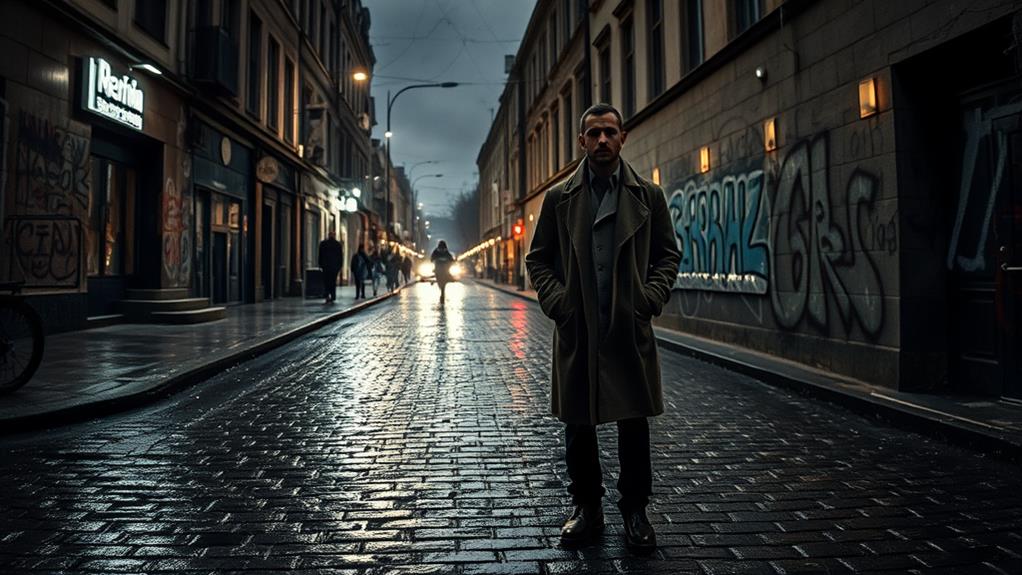In 'Alone in Berlin,' you explore the extraordinary courage of Otto and Anna Quangel as they resist the Nazi regime through their postcard campaign. Set in 1940s Berlin, the novel reveals the brutal realities of life under a totalitarian state, where fear stifles dissent and renders ordinary acts of defiance immensely significant. Grief drives their activism, showcasing how personal loss can ignite a fierce determination to confront tyranny. This powerful narrative sheds light on the moral complexities faced by those who dared to oppose oppression. Discover the layers of this story and what it reveals about human bravery and resilience.
Overview of the Novel
Set against the grim backdrop of 1940s Berlin, "Alone in Berlin" by Hans Fallada tells the poignant story of Otto and Anna Quangel, a working-class couple who, fueled by grief over their son's death in the war, take a stand against the oppressive Nazi regime.
Their journey unfolds through small yet powerful acts of resistance, as they distribute anti-Nazi postcards throughout the city. These seemingly minor actions highlight the courage of ordinary people in the face of tyranny, illustrating how acts of resistance can be pivotal in undermining oppressive regimes.
Fallada's narrative captures the pervasive atmosphere of fear and suspicion that enveloped Berlin under the Gestapo's watchful eye. As you explore the Quangels' struggle, you see how their resolve challenges the notion that only grand gestures can effect change.
Their story emphasizes that even the smallest acts can resonate within a larger resistance movement.
"Alone in Berlin" illustrates the moral complexities of defiance, showcasing how grief can transform into a powerful catalyst for action. The Quangels become symbols of resilience, reminding you that courage doesn't always roar; sometimes, it whispers through acts of resistance performed by those who simply refuse to remain silent.
Historical Context
In "Alone in Berlin," you see the chilling reality of life under Nazi Germany's oppressive regime, where fear and control stifled the populace.
The Quangels' courageous act of writing postcards denouncing Hitler exemplifies how individual actions can challenge tyranny, reminding you that even in dark times, individuals can spark courage and defiance.
This historical backdrop sets the stage for understanding the moral complexities ordinary people faced as they navigated their troubled world, revealing the severe risks associated with political dissent.
Nazi Germany's Oppressive Regime
During the years of Nazi Germany's oppressive regime from 1933 to 1945, citizens lived under a totalitarian state that thrived on fear and repression. The Nazi regime utilized widespread surveillance and censorship to control the populace, fostering an atmosphere where dissent was almost unimaginable.
The Gestapo, the regime's secret police, instilled terror through arbitrary arrests and brutal interrogations, leaving many too afraid to speak out.
As the regime implemented its anti-Semitic policies, millions of Jews and marginalized groups faced systemic persecution and extermination in concentration camps, a horrific reality exemplified by the Holocaust. Propaganda further reinforced the regime's ideology, manipulating public opinion to guarantee that dissenting voices were silenced or marginalized.
In this oppressive environment, responses varied. While many chose conformity or complicity out of fear, others, like Otto and Anna Quangel in "Alone in Berlin," engaged in acts of defiance.
These small acts of resistance highlight the courage that some individuals found amid overwhelming oppression, reminding us of the human spirit's capacity to resist even in the darkest of times.
Personal Stories of Resistance
Amid the oppressive atmosphere of Nazi Germany, personal stories of resistance emerged, revealing the courage of individuals who dared to challenge the regime. One poignant example is Otto and Elise Hampel, who turned their grief into action after losing their son in 1940. Motivated by personal loss, they initiated a postcard campaign that became a powerful symbol of defiance.
Their small acts of resistance, like distributing anti-Nazi messages, illustrate how ordinary people can stand against tyranny.
Otto and Anna Quangel's efforts also highlight the impact of these seemingly insignificant actions. Their decision to spread dissent through postcards resonated with many, inspiring broader movements of resistance.
However, the reality for dissenters was grim; the constant fear of arrest loomed over every act of defiance, leading many to face brutal consequences.
In "Alone in Berlin," the stories of the Quangels and Hampels remind us of the moral complexities involved in resistance. These characters confront their own tragedies while bravely opposing oppression, showcasing the profound impact of personal stories of resistance against a backdrop of overwhelming fear.
Their courage, though met with dire consequences, shines as a proof of the human spirit's resilience.
Themes of Resistance

Set against the backdrop of Nazi Germany, "Alone in Berlin" powerfully explores the theme of resistance through the actions of ordinary individuals. The central couple, Otto and Anna Quangel, embodies this struggle as they choose to resist the oppressive regime through small but significant acts. By distributing anti-Nazi postcards, they demonstrate that acts of defiance don't have to be grand to be impactful; even the simplest gestures can challenge totalitarianism.
Their brave actions resonate with the lesson that small acts of defiance can spark solidarity within a community, inspiring others to join the fight against tyranny.
Their postcards serve as a potent symbol of resistance, showcasing how ordinary people can stand against overwhelming fear and oppression. The narrative reveals the moral complexities and personal sacrifices involved in their choice to resist. Motivated by the grief of losing their son, the Quangels' actions illustrate how personal tragedies can ignite a fierce determination to fight against tyranny.
However, the story also underscores the brutal realities faced by dissenters. The Quangels' eventual betrayal and execution highlight the randomness of fate in wartime, reminding you that courage, while noble, often comes with dire consequences.
Their journey reflects the emotional undercurrents that drive resistance movements, showing that even when one feels alone, the fight against injustice can resonate deeply within the human spirit.
Character Analysis
As Otto Quangel grapples with the profound grief of losing his son, he transforms from a passive citizen into a reluctant hero, igniting the anti-Nazi postcard campaign that defines his character. This act of defiance showcases his moral courage, as he risks everything to challenge the oppressive regime in a manner reminiscent of characters like Liesel Meminger, who also embody resilience amidst adversity in the struggle against tyranny.
His wife, Anna Quangel, initially apolitical, evolves alongside him, demonstrating how personal loss can galvanize individual agency. She becomes an active participant in the resistance, reflecting the power of shared grief to inspire action.
In contrast, Inspector Escherich embodies the relentless pursuit of dissenters, representing the dangers faced by those who resist. His determination to capture Otto and Anna highlights the oppressive mechanisms of the Nazi regime, as he seeks to quash any spark of rebellion.
The characters surrounding Otto and Anna further enrich the narrative. Eva Kluge, the postwoman, unwittingly connects everyday citizens to the larger struggle, while Frau Rosenthal symbolizes the vulnerable individuals targeted by the Nazis.
Together, these characters illustrate the complex moral landscape of resistance and the human costs of standing against tyranny.
Impact of the Book

While reading "Alone in Berlin," you may find yourself awakening to the idea that protest doesn't always require grand gestures; sometimes, it's the quiet, everyday actions that can spark significant change. The impact of the book resonates deeply, illustrating how emotional pain drives activism, as seen through the Quangels' resolve after their son's tragic death.
Their subtle acts of defiance, particularly the distribution of postcards, showcase the power of individual actions against tyranny during World War II. Much like the characters in *The Daughters of Night*, who navigate the dark underbelly of society, the Quangels exemplify the courage it takes to confront oppressive forces.
This narrative not only highlights the importance of personal bravery but also encourages you to contemplate your role in activism. It reveals how ordinary people standing up against oppressive regimes can inspire broader movements. Fallada's work serves as a poignant reminder that resistance doesn't always need to be loud; even small acts can create ripples of change.
As you connect with the characters, you may start to recognize the significance of moral courage in your own life. The book challenges you to reflect on how you might respond to oppression and inspires a deeper understanding of the collective power individuals possess when they stand together, even in the smallest ways.
Film Adaptation
The film adaptation of "Alone in Berlin" brings to life the poignant story of Otto and Anna Quangel, showcasing their transformation from ordinary citizens to determined resisters against the Nazi regime. Directed and co-written by Vincent Pére, the film premiered at the Berlin International Film Festival on February 15, 2016.
With Emma Thompson as Anna and Brendan Gleeson as Otto, you'll see their compelling journey unfold, driven by the tragic death of their son. This powerful narrative resonates with the themes of resilience and strength often highlighted in stories of those who face adversity, echoing the courage and determination to overcome challenges seen in the experiences of survivors.
The film dives deep into the emotional and moral complexities of Otto and Anna's resistance as they initiate a campaign of distributing anti-Nazi postcards throughout Berlin. This act of defiance reflects their growth from apolitical individuals to courageous fighters against totalitarianism.
Filming in locations like Berlin and Görlitz adds authenticity, immersing you in the wartime atmosphere.
Collaboration among British, German, and French filmmakers enriches the narrative, effectively capturing the essence of Hans Fallada's original story. You'll appreciate how the adaptation not only honors the true story of Otto Quangel but also highlights the profound struggles faced by those living under oppressive regimes.
It's a powerful portrayal of courage and resilience that resonates today.
Recommended Reading

If you're intrigued by the themes of resistance in "Alone in Berlin," you might want to explore "A Canticle for Leibowitz," which tackles moral courage in a post-apocalyptic setting.
The exploration of identity and community in the face of oppression resonates deeply with the sentiments found in systemic racism and historical legacies.
For a broader historical context, check out "A Brief History of the Dynasties of China," as it sheds light on power dynamics and resistance throughout time.
These reads will enrich your understanding of the struggles against oppression that resonate in Fallada's work.
Related Historical Context
Within the harrowing backdrop of World War II, understanding the historical context of "Alone in Berlin" is crucial for grasping its profound themes. The novel draws inspiration from the true story of Otto and Elise Hampel, a German couple who dared to resist the Nazi regime by launching a postcard campaign after their son's tragic death. This act of defiance stands out against the oppressive atmosphere that stifled countless people in Germany during this dark period.
Hans Fallada's work, published in 1947, reflects the intense psychological toll of living under totalitarian rule. It illustrates the moral complexities individuals faced when deciding whether to stand up against tyranny. The consequences of dissent were brutal, yet the Hampels' story embodies the courage needed to challenge injustice.
"Alone in Berlin" serves as a crucial reminder of the power of personal activism, shedding light on the everyday struggles of those who resisted. This historical context not only enriches your understanding of the novel but also emphasizes the importance of moral courage in oppressive situations.
As you read, consider the implications of their resistance and the resilience of the human spirit.
Themes of Resistance
Understanding the historical context of "Alone in Berlin" sets the stage for exploring its central theme: resistance. The narrative revolves around Otto and Anna Quangel, a working-class couple whose small but significant acts of defiance—distributing anti-Nazi postcards—illustrate how resistance can manifest in subtle yet impactful ways.
Their courage highlights the moral complexities faced by those living under the oppressive weight of a totalitarian regime. As you explore their story, you'll feel the immense fear and paranoia that permeated everyday life.
The Quangels' actions, motivated by personal tragedy, remind you that even ordinary individuals can rise against injustice. Their resistance, though minimal, inspires doubt in the populace and contributes to a larger movement against tyranny.
"Alone in Berlin" serves as a potent commentary on the psychological toll of dictatorship, urging you to recognize the moral courage needed to challenge authority. The consequences of such bravery are profound, as the narrative reflects on the untold stories of wartime heroes.
It encourages you to appreciate that every act of resistance counts, no matter how small, in the fight for freedom and justice.
Conclusion
In a world teetering on the brink of despair, "Alone in Berlin" isn't just a book; it's a thunderous rallying cry for courage and defiance! You can almost feel the pulse of history as you turn each page, igniting a fire within you to resist oppression. This novel doesn't just capture a moment in time; it catapults you into a whirlwind of emotions, challenging you to stand up and shout against tyranny. Don't just read it—experience it!



